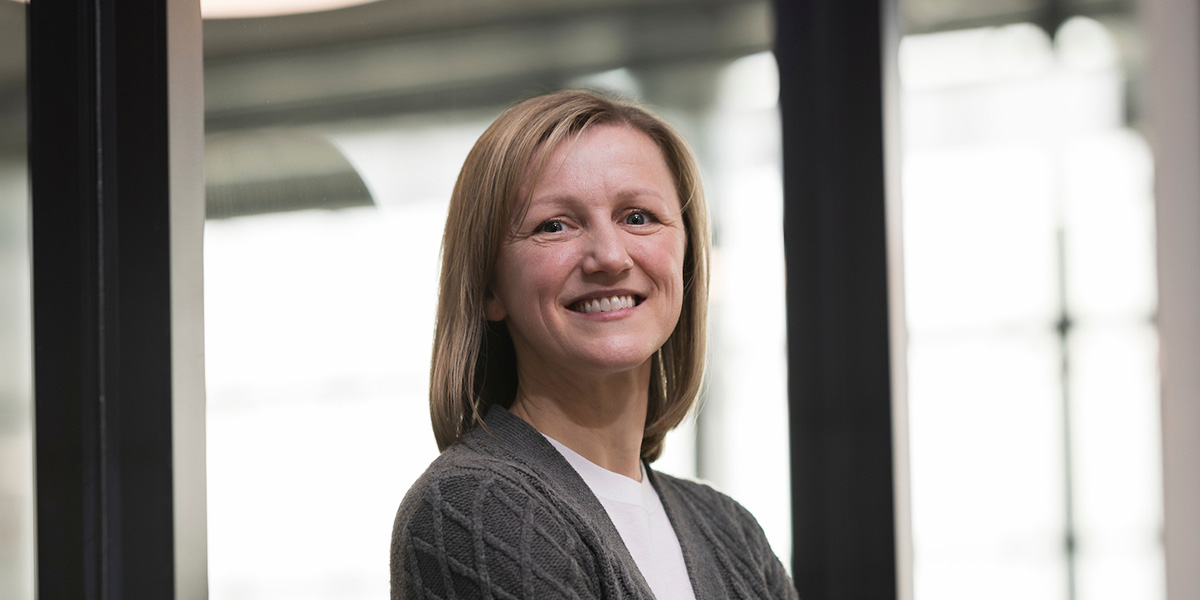Can you prevent health problems before they start? Public health program helps this Binghamton student find out
Occupational therapist Nicole Keibel explores new ways of improving healthcare

As an occupational therapist for over 20 years, Nicole Keibel acknowledges that healthcare often focuses too much on putting out fires — reacting to problems as they arise — rather than prevention.
“Occupational therapists see a lot of social determinants of health that affect a person’s ability to function in society or independently,” said the OT and certified lymphedema therapist who works at UHS Binghamton General Hospital. “Seeing this repeatedly made me realize we need to consider the bigger picture: What prevents someone from being independent or from taking care of themself and their family? How can we address these issues to improve healthcare.”
This realization led Keibel to explore public health, which she believes shares OT’s objective of enhancing a person’s quality of life. The main challenge lies in identifying issues early and addressing them before they worsen.
“Through my educational experience, I’ve learned that an upstream approach — focusing on prevention and systemic changes — can be more effective in fostering long-term well-being,” she said.
A bout with COVID in 2022 kept Keibel home for a couple of weeks and gave her time to research Master of Public Health programs. She applied to several and was accepted, but the MPH program at Binghamton University’s Decker College of Nursing and Health Sciences proved the most advantageous.
What really tipped the scales in Decker’s favor, she said, is that the program is in person.
“I’m a people person. I like talking to people face to face, and I’m a kinesthetic learner. When I experience things physically, I learn better,” she said.
Also helpful in making her decision: a chat with Annie DePugh, system director, UHS Population Health Management and a 2022 graduate of Decker’s MPH program.
“I spoke with Annie because I wanted to confirm whether it’s doable to earn an MPH while working,” Keibel said. “She explained what the workload was like and gave me a better idea of what I was getting myself into.”
Keibel, in her third year of the program, is performing her first internship in DePugh’s office. The experience has helped her realize what all of the lessons in her first year were leading toward.
“Initially, it felt like I was just trying to get through everything without fully grasping it. But now I understand the connections and reasons behind the classes we took,” Keibel said. “I’m sure everything will come together even more with my internship.”
Although the MPH program boasts a demanding workload, Keibel credits the excellent faculty with helping make it such a rewarding experience.
“They’re very involved in the community and have created a comfortable learning environment where you can ask the same question as many times as you need to until you understand it,” Keibel said.
Keibel said her fellow MPH students genuinely care about the world and each other. The cohort consists of students from diverse backgrounds and varying viewpoints, and although she often feels like she is different from them (joking that she could be old enough to be their mother), she values the respect they show for one another’s thoughts and opinions, even when they disagree.
Caring by nature, Keibel often brings treats for the class and has earned the nickname “class mom.” She’s comfortable with the moniker.
“When it comes to being the ‘class mom,’ I believe my ability to communicate openly with my cohort helps create a supportive environment where people feel comfortable asking questions and engaging in discussions,” she said. “I strive to make others feel at ease, much like a parent would, fostering a sense of community. And, I enjoy bringing healthy snacks to share during long class sessions!”
